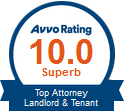Attorney Tom H. Elke’s Answers:
Q:
Can my landlord raise the rent for using our dining room as bedroom? We currently live in a 2 bedroom flat in San Francisco that has a formal dining room (no closet, yes window). 3 years ago we signed this lease specifically for the fact that they said it could be used as a bedroom (we have no written proof). Now, they are saying we have violated our lease by doing this because the lease says “(2 bedroom one bath flat)”, and that the dining room is not a bedroom. Having 3 people there is not the issue, the issue is only the use of the formal dining room as a bedroom. The two options they’ve given us is A) move all 3 people into sharing 2 bedrooms, or B) re-sign a new lease at market rates for a 3 bedroom with no changes to the room.
So basically, suffer in 2 bedrooms, or pay more and well consider it a bedroom. Is this legal??? — Asked over 1 year ago in Landlord & Tenant
A:
No. You can essentially use your apartment any way you want assuming it is not for an illegal purpose, violates your lease, causes a nuisance, or substantially damages the premises. — Answered over 1 year ago
Q:
I am trying to get out of a lease on a house. I don’t feel that the landlord is doing much to facilitate us. What can I do? The landlord is in India until late Feb. I told him in December that we want to be out by March. He won’t sign anyone to a lease until he meets them. I posted the ad on craigslist for the house. I also screened phone calls and showed the house to multiple families. I even collected the necessary paperwork the landlord needed. Am I stuck until he gets around to meeting people when he is back in town? The prospective tenants I have found now probably won’t wait until late Feb to sign a lease. They would also need a months notice to get out of their lease. So am I stuck?
Also the landlord is refusing to deal with the rats that are underneath the house. — Asked almost 2 years ago in Landlord & Tenant
A:
Generally when a tenant breaks a lease, the landlord is entitled to all lost rent for the remainder of the lease term. However, landlords must mitigate their monetary damages by making a good-faith effort to re-rent the unit at a similar rental rate. As soon as the unit is re-rented, the tenant is no longer liable to pay future monthly rent. In other words, a landlord is not allowed to “double-dip” – being paid by both you and the new tenant for the same apartment. The landlord must do everything “reasonable” to re-rent the unit. Whether being in India and being unable to return to “meet” prospective tenants is reasonable would be a question for a judge/jury to determine assuming he sues you for breach (most likely in small claims court in Santa Clara County).
When does your lease term end? — Answered almost 2 years ago
Q:
Does a subtenant have the same rights as a master tenant would? as a subtenant paying rent to the master tenant and not the building, do i have my tenant rights? the building made me do a credit and background check, but my rent is paid to the main tenant. however, i am having a serious issue with the building. they are constantly doing construction on other units, using the SLOWEST crew in the world. and they keep shutting off our water and this is the second time i have had to get a bowl, and use my fridge brita water canister and clean up with a wash cloth. they keep waking us up, they have entered the unit countless times, and the fliers are so constant its hard to ever know whats current and not. there is no quiet and enjoyment, and I’ve sent an anonymous letter and they still did nothing. what can i do? — Asked almost 2 years ago in Landlord & Tenant
A:
It is a little complicated. Generally speaking a sub-tenant in San Francisco has the same rights as a “normal tenant”. This is especially true if the Landlord knows of your tenancy and approved an application. However, there are some facts which can affect your rights.
Do you have a written lease with the Master Tenant? Did you sign any written agreement with your Master Tenant before moving-in?
I recommend going down to the SF Tenant’s Union on Capp Street for some advice regarding your situation and your rights. Their website lists the days/hours counselors are available for consultation.
Good luck!!! — Answered almost 2 years ago
Attorney Alex Merchant’s Answers:
Q:
When giving your 30 day notice when do you have to schedule the walk through? We gave 30 day on the 1st. Tomorrow is our last day the landlord says they need to do walk thru before 5 pm. We still need that time for cleaning. We still rent until midnight of that night and walk through should be the next day, correct? — Asked almost 2 years ago in Landlord & Tenant
A:
There are supposed to be two separate inspections: (1) a pre-move out inspection in which the landlord tells you what he thinks you need to repair in order to get your full security deposit; and (2) a final inspection after you have vacated the unit for the landlord to document what was not repaired and send you the bill.
If you are asking about the final inspection, then it must happen after you move out.
If you are asking about the pre-move out inspection, you have probably waited too long. You won’t have time to repair anything the landlord claims you need to fix. I recommend still doing the inspection with the landlord present so that you can contest any potential deductions.
But, if your landlord didn’t notify you of your right to request a pre-move out inspection, your landlord may have waived the right to make any deductions. Take a good look at Civil Code section 1950.5(f) for the law on inspections. It state, in part:
Within a reasonable time after notification of either party’s intention to terminate the tenancy, or before the end of the lease term, the landlord shall notify the tenant in writing of his or her option to request an initial inspection and of his or her rightto be present at the inspection … At a reasonable time, but no earlier than two weeks before the termination or the end of lease date, the landlord, or an agent of the landlord, shall, upon the request of the tenant, make an initial inspection of the premises prior to any final inspection the landlord makes after the tenant has vacated the premises. The purpose of the initial inspection shall be to allow the tenant an opportunity to remedy identified deficiencies, in a manner consistent with the rights and obligations of the parties under the rental agreement, in order to avoid deductions from the security. If a tenant chooses not to request an initial inspection, the duties of the landlord under this subdivision are discharged. If an inspection is requested, the parties shall attempt to schedule the inspection at a mutually acceptable date and time. — Answered almost 2 years ago
Q:
Are there guidelines for the life expectancy of home decor item such as blinds? I need help determing “normal “wear and tear”: My husband and I have been renting here for 7 years. Landlord want me to replace vertical blinds that were here before we rented. Although I can admit the kids did do some damage , they were not new when we moved in. Also, can landlord use deposit for damage to grass from above ground pool if we got their verbal approval to install it. The area was a combo of dirt patches, crab grass and grass, and the owners agreed that the grass was not going well. Other half of yard remains the above mentioned combination of dirt,, weed, and sparse grass.— Asked almost 2 years ago in Landlord & Tenant
A:
The California Department of Consumer Affairs discusses the “useful life” rule as applied to carpets and drapes here: http://www.dca.ca.gov/publications/landlordbook…. Note that these are merely guidelines and no judge or jury is required to follow them.
The useful life of your blinds would depend on the specific model that was in your unit. You should ask your landlord for the model information and when they were installed. After 7+ years, they may have exceeded their useful life. — Answered almost 2 years ago
Q:
I think I will be evicted. After the landlord gives the three-day notice to vacate, do they have to file unlawful detainer also? I am wondering whether the landlord has to file an unlawful detainer suit if I don’t leave following the three-day notice to vacate, or whether I will be physically removed from the premises after the required notice period. — Asked about 2 years ago in Landlord & Tenant
A:
Your landlord must file an unlawful detainer before you can be evicted. Only the sheriff can physically evict you, which will not happen until your landlord obtains a judgment against you in the unlawful detainer action. — Answered about 2 years ago.













